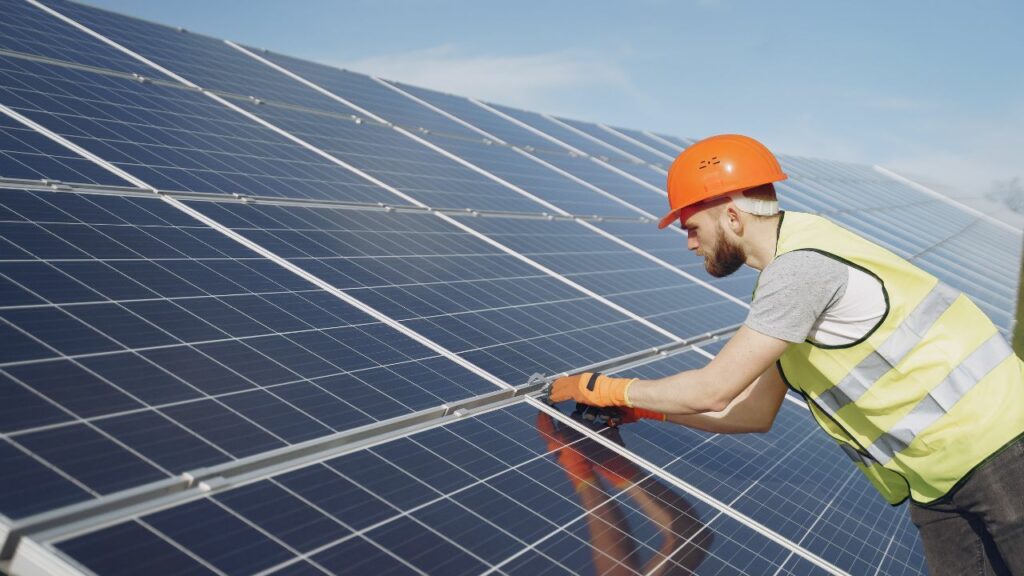Understanding the Cost of Commercial Solar Panels: A Comprehensive Guide
Are you a business owner looking to upgrade to a commercial solar system? If so, you’re certainly not alone.
In recent years, the cost of solar panels has dropped dramatically, making them an increasingly attractive option for business owners.
But how much does a commercial solar system cost? And what factors impact the cost of the commercial system?
In this comprehensive guide, we’ll cover everything you need to know about commercial solar panels, including the benefits of installing them, what factors impact their cost, average cost, financing options, grants, and incentives, understanding commercial solar panel systems, maintenance and repairs, and what you can expect from commercial solar installations.
Provo Green Products is your reliable source for discovering sustainable products that can positively impact your life and the environment.
With extensive experience in manufacturing, trades, and construction, Provo Green Products thoroughly researches each product before providing accurate and up-to-date information on its sustainability.
You can trust that you’re getting trustworthy insights to make informed choices whether you’re looking for solar products, electric bikes, eco-friendly products, renewable energy solutions, etc.
Provo Green Products is your go-to destination for finding the right green products for your lifestyle.
Disclosure: As an Amazon Associate, I earn from qualifying purchases. This does not affect the product pricing whatsoever.
Introduction to Commercial Solar Panels
Commercial solar panels are an excellent way for business owners to reduce their energy costs and carbon footprint.
With these panels, businesses can generate their electricity from the sun’s energy, which can then be used to power their operations.
This type of renewable energy source is becoming increasingly popular among businesses of all sizes, from small to large.
Commercial solar panels are typically larger than residential ones and are designed to generate more electricity.
They are usually installed on a rooftop or other flat surfaces and can be connected to the local power grid.
This allows businesses to reduce their electricity bills by selling excess electricity back to their utility company.
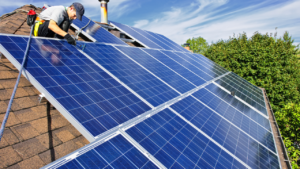
Benefits of Installing Commercial Solar Panels
Installing commercial solar panels has many benefits for business owners, including reduced energy costs, financial savings, and environmental benefits. Some of the top benefits of installing commercial solar panels:
- Reduced energy costs: Businesses can reduce their electric bill by generating their own electricity. Depending on the size of the system and the amount of electricity generated, businesses can save hundreds or even thousands of dollars a year on their utility bills.
- Financial savings: Commercial solar power systems can also provide businesses with financial savings over the long term. With incentives, grants, and financing options available, companies can pay for their system over time and reduce their upfront costs.
- Environmental benefits: Commercial solar panels can help businesses reduce their environmental footprint. By generating their electricity, companies can reduce their dependence on traditional energy sources like coal and natural gas, which have a much larger carbon footprint.
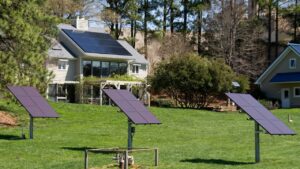
What Factors Impact the Cost of Commercial Solar Panels?
The cost of commercial solar panels depends on various factors, including the system’s size, the installation’s location, and the type of solar panels used.
Here are some of the factors that can impact the cost of commercial solar panels:
- Size of the system: Size is one of the most critical factors that can impact the cost of commercial solar panels. The larger the system, the more the price will be. It’s essential to consider your energy needs and determine the system size that will best meet those needs.
- Location of the installation: The facility’s location can also impact the cost of commercial solar panels. If the area has high electricity costs, then the cost of the system will be higher. It’s essential to research the local electricity rates before making a decision.
- Type of solar panels used: The type of solar panels used can also impact the cost of commercial solar panels. Different solar panels have different efficiencies, which can affect the price. Researching the different types of panels and determining which type is best for your needs is essential.
How Much Do Commercial Solar Panels Cost?
The cost of commercial solar panels can vary widely, depending on the system’s size, the installation’s location, and the type of panels used.
Generally speaking, solar panel costs are higher than residential ones, but the cost can still be reduced with tax incentives, grants, and financing options.
The average price of commercial solar panels can range from $43,500 to $56,000 for a 25-kilowatt system, depending on the abovementioned factors.
For larger systems, the cost can range between $175,000 to $225,500 for a 100-kilowatt system before tax credits.
It’s essential to research the different options and determine the best price for your business.
Financing Options for Commercial Solar Panels
Various financial incentives are available for businesses looking to install commercial solar panels.
These include loans, grants, and tax credits. Here are some of the financing options available:
- Loans: Businesses can use loans to finance the cost of commercial solar panels. Several loan options are available, including traditional bank loans, government-backed loans, and specialized solar loans. It’s essential to research the different options and determine which loan is best for your business.
- Grants: Businesses can also take advantage of grants to help finance the cost of commercial solar panels. There are a variety of grants available, including federal and state grants, as well as private grants. Researching the different grants and deciding which one is best for your business is essential.
- Tax credits: Businesses can also use tax credits to offset the cost of commercial solar panels. The federal government offers a variety of tax credits for businesses installing solar panels, as do many states. Researching the different tax credits and determining which ones are available in your area is essential.
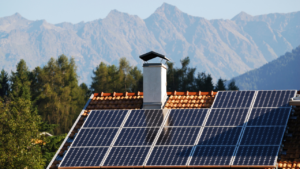
Grants and Incentives for Business Owners Installing Commercial Solar Panels
In addition to financing options, various grants and incentives are available for business owners installing commercial solar panels.
These can reduce the cost of the system and make it more affordable.
Here are some of the grants and incentives available:
- Federal grants: The federal government offers a variety of grants for businesses installing commercial solar panels. These grants can help cover the cost of the system and make it more affordable. I think it’s essential to research the different grants and determine which ones are available in your area.
- State incentives: Many states also offer incentives for businesses installing commercial solar panels. These incentives can include tax credits, rebates, and grants. Researching the different incentives and determining which ones are available in your area is essential.
- Local utility company incentives: Utility companies often offer incentives for businesses installing commercial solar panels. These can include reduced electricity rates for companies that generate their electricity. Researching the different incentives and determining which ones are available in your area is essential.
Understanding Commercial Solar Panel Systems
Before installing commercial solar panels, it’s essential to understand how they work.
Commercial solar panel systems can consist of solar panels, a charge controller, an inverter, a battery(s), and wiring.
Here’s a closer look at each of these components:
- Solar panels are the most essential commercial solar panel system component. They capture the sun’s energy and convert it into electricity.
- Charge Controller: Regulates the voltage and current coming from the solar panel(s) and keeps the battery from overcharging or discharging.
- Inverter: An inverter is used to convert the DC power from the solar panels to AC power to be used in the building.
- Battery: A battery is used to store the electricity generated by the solar panels for later use.
- Wiring: Wiring connects the solar panels, charge controller, inverter, and battery(s).
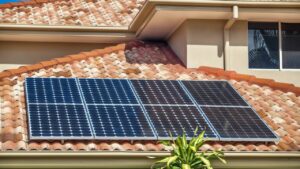
Maintenance and Repairs for Commercial Solar Panels
Once commercial solar panels are installed, it’s essential to maintain and repair them regularly.
Regular maintenance and repairs ensure the system functions correctly and generates the maximum amount of electricity.
Here are some of the maintenance and repair tasks that should be done regularly:
- Cleaning: Solar panels should be cleaned regularly to remove dust and debris. This will help ensure that the system generates the maximum amount of electricity.
- Inspections: Solar panels should be inspected regularly for any damage or wear and tear. This can help identify any problems before they become more serious.
- Repairs: Any necessary repairs should be done as soon as possible. Delaying repairs can lead to more severe problems and increased costs.
Commercial Solar Installations: What To Expect
When installing commercial solar panels, knowing what to expect is essential.
The process can take anywhere from a few days to a few weeks, and this depends on the system’s size and the installation’s complexity.
Here’s what you can expect when installing commercial solar panels:
- Site Assessment: The site must be assessed before the installation begins. This includes measuring the area, determining the solar panel’s best orientation, and evaluating the electrical system.
- Permitting: Depending on the location, you may need to apply for permits before the installation can begin. It’s essential to research the local regulations and determine the required permits.
- Installation: The installation can begin once the site assessment and permitting are complete. This typically involves mounting the solar panels to the roof or other flat surfaces and connecting them to the electrical system.
- Commissioning: The system must be tested and commissioned once the installation is complete. This involves ensuring the system functions correctly and generates the expected amount of electricity.
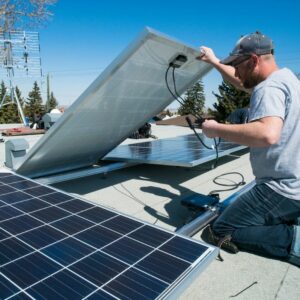
Conclusion
Installing commercial solar panels is an excellent way for business owners to reduce their energy costs, save money, and reduce their environmental footprint.
But how much do commercial solar panels cost? And what factors impact the price?
In this comprehensive guide, we’ve covered everything you need to know about commercial solar panels, including the benefits of installing them, what factors impact their cost, how much they cost, financing options, grants, and incentives, understanding commercial solar panel systems, maintenance and repairs, and what you can expect from commercial solar installations.
So if you’re a business owner looking to upgrade to commercial solar panels, now you know what’s involved with the cost of commercial solar panels and how to get the most out of your investment.
We also recommend talking with a few local solar companies in your area to ensure you get the appropriate system for your needs.
These companies have the most up-to-date software systems and estimation sheets.
You will know when you have found the company you want to work with.
Stay in Touch!
I’am a dedicated entrepreneur with many years of experience and an integrity-driven individual who is highly motivated to succeed. Leveraging extensive expertise in manufacturing, construction, and various trades, we can provide a solid foundation for sustainable living. Our meticulous research process guarantees that our information about each product is precise and current, allowing you to make informed decisions. A deep understanding of business operations empowers me to consistently implement improvements that result in ongoing success. Visit site.

